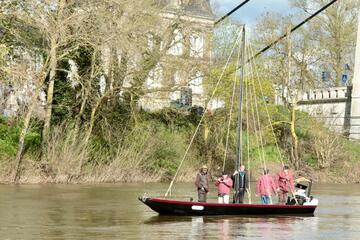
09/04/2024
[Fr] L'Alose, une plate de Loire remise à l'eau à Chalonnes-sur-Loire
Samedi 30 mars, le quartier des mariniers était en liesse. Ils étaient nombreux à avoir répondu à l’invitation des Chalandoux du 5ᵉ Vent pour accompagner...
Published on 30 November 2010 - Updated 11 May 2015
Cet article date d'il y a plus de 13 ans
Created at the instigation of the Mission Val de Loire and Interloire, the join-trade organisation of Loire Valley Wines, the VITOUR network brings together seven European vineyards included on the list of UNESCO World Heritage sites.
These remarkable sites all share a common commitment: restoring, protecting and sharing their exceptional landscape and cultural identities. Behind the names of the most prestigious European wines lie regions whose inhabitants are committed to preserving specific knowledge and skills. This rich culture, accumulated patiently over the course of the centuries in certain parts of the European Union, now finds itself under threat: adaptation to the global economic environment brings with it forms of agricultural, tourist and urban development that are at odds with the exceptional nature of these areas.
How can the standardisation of tastes and development be avoided? How to combat competition from the New World? Reasserting the culural and landscape uniqueness of these vineyards is becoming essential to guarantee the long-term economic vitality required to maintain these exceptional landscapes.
The challenge is to design, together, new tools for the sustainable development of these regions, and it is a challenge that needs to be faced up to by involving both public-sector decision-makers and professionals in the wine and tourism sectors.
To meet these challenges, an international charter, the "Fontevraud Charter", is gradually uniting European vineyards around four key commitments and a benchmark international network, known as VITOUR.
The VITOUR project aims to create new standards for sustainable development in UNESCO World Heritage sites by combining landscape management and a development of innovative tourist offers.
It involves:
The VITOUR network is made up of seven partners from six European Union Member States:
- Lead partner:
the cross-regional organisation, the Val de Loire Mission
, in partnership with the
join-trade organisation of Loire Valley wines, Interloire
, France
-
the former Jurisdiction of the Saint-Emilion
, France
-
the World Heritage Association of Ferto-Neusiedler See
, Austria
-
the Douro and Porto Wines Institute
, Portugal
-
the Rheinland – Pfalz region
, Germany
-
the Cinque Terre National Park
, Italy
-
the World Heritage Association of Tokaj
, Hungary
The network involves both representatives from the public authorities and professionals involved in the wine and tourism sectors.
The total budget for the project is €639,000, 60% of which is funded by the European Union as part of the INTERREG III C programme, with the remaining 40% funded by the partners.
The project will run for 30 months, from July 2005 to December 2007.
VITOUR_workplan
Six VITOUR meetings, comprising interregional technical workshops for the partners, a steering committee meeting and a public session to feed back the progress of the project to a wider audience in the host site have been held or are planned, as follows:
The four main activities of the programme:
1/ Administrative and financial management of the project, provided by the Val de Loire Mission
2/ Development of common tools and strategic guidelines
- A platform for sharing information and exchanging ideas based on pooling the knowledge acquired and actions taken at each site (heritage, landscape, cultural and tourist resources, and good practices in terms of site management and promotion).
- An expertise on adapting each site to meet the international demand for wine tourism
- A network action plan based on a common charter for sustainable management of each site and the sites' commitments to pilot initiatives.
3/ Interregional seminars on landscape management and innovative tourist offers
- Four two-day workshops, each including a public session between representatives from local authorities and professionals involved in training and development, and field visits:
4/ Dissemination of results
- Communications strategy
- Two INTERREG presentations to disseminate results at international wine fairs (March 2006: ProWein - Düsseldorf + June 2007: Vinexpo - Bordeaux), involving projects working on similar topics (INTERREG and other regional projects).
After this first Vitour project Vitour, a second project has been accepted by the European Union.
Vitour II project « VITOUR landscapes » starts in 2010.
Myriam LAIDET, Sustainable development Officer for Mission Val de Loire
Bien reçu !
Nous vous répondrons prochainement.
L’équipe de la Mission Val de Loire.